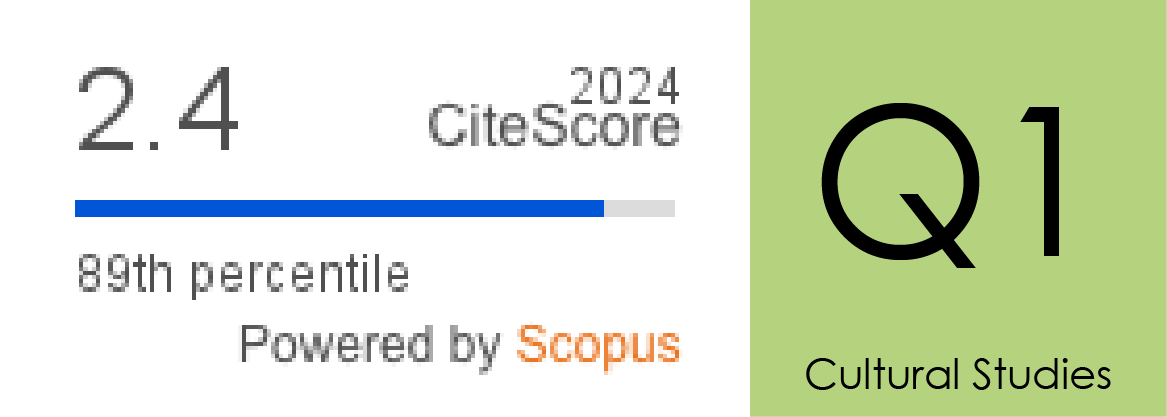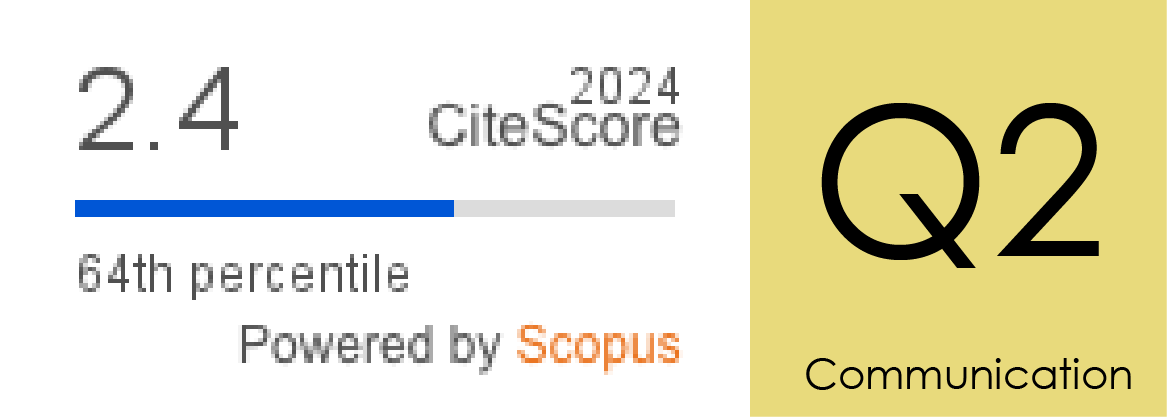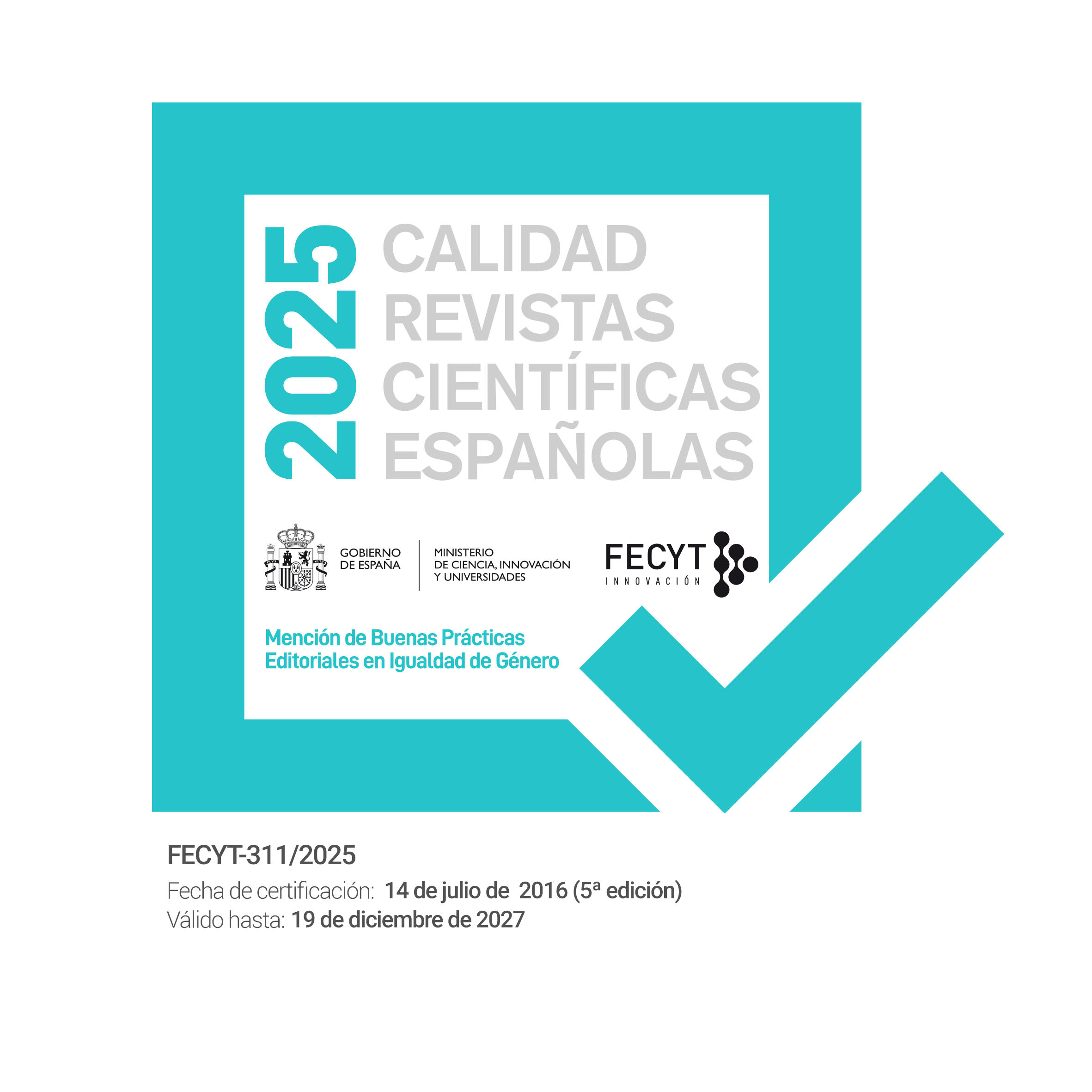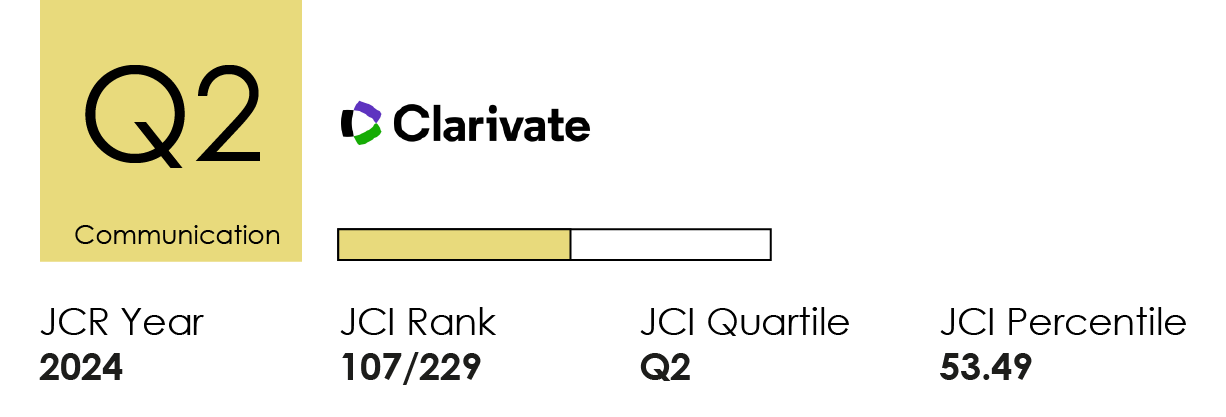Jugando con la verdad: los newsgames como herramienta de alfabetización sostenible para la verificación
DOI:
https://doi.org/10.14198/MEDCOM.26757Palabras clave:
alfabetización, desinformación, Innovación social, Newsgame, sostenibilidad, verificaciónResumen
La principal hipótesis de este estudio enuncia que los newsgames son una herramienta de innovación sostenible que puede ayudar a enmendar problemas sociales. Teniendo en cuenta este postulado, el objetivo principal de la investigación se centra en analizar el potencial de los newsgames para alfabetizar a los jóvenes sobre el fenómeno de la desinformación, ya que este desorden informativo es uno de los mayores peligros a los que se enfrentan las sociedades contemporáneas. Para ello, se ha diseñado una herramienta para el análisis de contenido de n=8 newsgames, con un enfoque cualitativo y cuantitativo. Los resultados obtenidos permiten concluir que los newsgames abordan temas relacionados con las demandas recogidas por la ONU –concretamente, en el ODS 10 de la Agenda 2030– y abren nuevos horizontes relacionados con la sostenibilidad social, la justicia social, la integración, la accesibilidad y la inclusividad. Estas narrativas tienen el potencial para prevenir situaciones de injusticia o desigualdad, ya que exponen al jugador a experiencias no deseadas. Aunque el enfoque lúdico predomina en estos videojuegos, su componente narrativo proporciona representaciones de mundos posibles que se asemejan mucho a la realidad y su fenomenología. Si bien estos elementos se presentan más desde una óptica de crítica y sátira, que de ejemplificación y defensa de principios periodísticos, pueden cumplir un papel de concienciación y plantear rutas de aprendizaje sobre buenas prácticas periodísticas, específicamente, sobre la verificación de hechos.
Citas
Abt, C. (1987). Games for Learning. University Press of America.
Adomßent, M., & Godemann, J. (2011). Sustainability Communication: An Integrative Approach. In J. Godemann & G. Michelsen (eds.), Sustainability Communication: Interdisciplinary Perspectives and Theoretical Foundations (pp. 27–37). Springer. https://doi.org/10.1007/978-94-007-1697-1_3
Aguaded, I. (2014). Desde la infoxicación al derecho a la comunicación. Revista Comunicar, 21(42), 7–8. http://dx.doi.org/10.3916/C42-2014-a1
Alardo Vico, E. (2020). Comunicación sostenible y sociedad 2.0: particularidades en una relación de tres décadas. Revista de Comunicación de la SEECI, (53), 37–51. http://dx.doi.org/10.15198/seeci.2020.53.37-51
Bardin, L. (1986). Análisis de contenido. Ediciones Akal.
Barlow, S. (Creador) (2019). Telling Lies. [Videojuego]. Sam Barlow & Furious Bee.
Barlow, S. (Creador). (2015). Her Story. [Videojuego]. Sam Barlow.
Basol, M., Roozenbeek, J., & Van der Linden, S. (2020). Good news about bad news: Gamified inoculation boosts confidence and cognitive immunity against fake news. Journal of Cognition, 3(1), 1–9. http://dx.doi.org/10.5334/joc.91
BBC & Aardman (Creadores). (2018). BBC iReporter. [Videojuego]. Aardman Animations.
Bell, A., & Ryan, M. L. (2019). Possible Worlds Theory and Contemporary Narratology. University of Nebraska Press. https://doi.org/10.2307/j.ctv8xng0c
Berelson, B. (1952). Content Analysis in Communication Researches. Free Press.
Bhattacharya, S., Wainwright, D., & Whalley, J. (2022) Value and sustainability in technology-enabled care services: a case study from north-east England. Public Money & Management, 42(4), 210–220. http://dx.doi.org/10.1080/09540962.2021.1992123
Bogost, I., Ferrari, S., & Schweizer, B. (2010). Newsgames: Journalism at play. MIT Press. https://doi.org/10.7551/mitpress/8854.001.0001
Boons, F., & McMeekin, A. (2019). Handbook of sustainable innovation. Edward Elgar Publishing. http://dx.doi.org/10.4337/9781788112574
Brandtzaeg, P. B., & Følstad, A. (2017). Trust and Distrust in Online Fact-Checking Services. Communications of the ACM, 60(9), 65–71. http://dx.doi.org/10.1145/3122803
Burton, J. (2005). News-game journalism: History, Current Use and Possible Futures. Australian Journal of Emerging Technologies and Society, 3(2), 87–99. https://acortar.link/xM3l12
Casado Romero, A., Nápoles Racionero, M. D., y Pérez López, C. A. (2010). Casos prácticos de diagnóstico pedagógico. Ediciones Universidad Castilla-La Mancha.
Castillo Lozano, E., Herrero de la Fuente, M., y Saavedra Llamas, M. (2023). La formación en verificación en España: análisis de la demanda profesional frente a la oferta de grado. Textual & Visual Media, 17(2), 4–21. http://dx.doi.org/10.56418/txt.17.2.2023.1
Chang, Y. K., Literat, I., Price, C., Eisman, J. I., Gardner, J., Chapman, A., & Truss, A. (2020). News literacy education in a polarized political climate: how games can teach youth to spot misinformation. Harvard Kennedy School Misinformation Review. https://acortar.link/0Cpfvq
Comisión Europea (2022). The 2022 Code of Practice on Disinformation. https://acortar.link/CNtooC
Crawford, C. (2012). Chris Crawford on interactive storytelling. New Riders.
Cuadrado, A. (2013). Acciones y emoción: un estudio de la jugabilidad en Heavy Rain. En C. A. Scolari (ed.), Homo Videoludens 2.0. De Pacman a la gamification (pp. 151–176). Universitat de Barcelona.
Cuadrado, A., y Planells, A. J. (2020). Ficción y videojuegos: teoría y práctica de la ludonarración. UOC.
Double Zero One Zero (Desarrollador). (2016). The Westport Independent [Videojuego]. Double Zero One Zero.
DROG & Cambridge University (Creadores). (2018). Bad news. [Videojuego]. Gusmanson.
DROG & Cambridge University (Creadores). (2020). Harmony Square. [Videojuego]. Gusmanson.
Ferrer-Conill, R. & Karlsson, M. (2016). The Gamification of Journalism. In H. Gangadharbatla & D. Z. Davis (eds.), Emerging Research and Trends in Gamification (pp. 356-383). IGI Global.
Foxman, M. (2015). Play the News Fun and Games in Digital Journalism. Columbia Journalism School.
Frau-Meigs, D. (2022) How Disinformation Reshaped the Relationship between Journalism and Media and Information Literacy (MIL): Old and New Perspectives Revisited. Digital Journalism, 10(5), 912–922. http://dx.doi.org/10.1080/21670811.2022.2081863
García-Avilés, J. A., Carvajal-Prieto, M., Arias, F., & De Lara-González, A. (2019). How journalists innovate in the newsroom. Proposing a model of the diffusion of innovations in media outlets. The Journal of Media Innovations, 5(1), 1–16. http://dx.doi.org/10.5617/jomi.v5i1.3968
García-Ortega, A., y García-Avilés, J. A. (2021). Uso del diseño lúdico para combatir la desinformación: los newsgames como herramienta para la concienciación sobre los bulos. Icono 14, 19(1), 179–204. http://dx.doi.org/10.7195/ri14.v19i1.1598
García-Ortega, A., y J. A. García-Avilés. (2018). Los newsgames como estrategia narrativa en el periodismo transmedia: propuesta de un modelo de análisis. Revista Mediterránea de Comunicación/Mediterranean Journal of Communication, 9(1), 327–346. http://dx.doi.org/10.14198/MEDCOM2018.9.1.19
Godin, B., & Gaglio, G. (2019). How does innovation sustain ‘sustainable innovation’. In F. Boons & A.
McMeekin (eds.), Handbook of Sustainable Innovation (pp. 27–37). Edward Elgar.
Gómez-García, S. (2014). ¿Pueden los videojuegos cambiar el mundo? Una introducción a los serious games. Universidad Internacional de La Rioja.
Gómez-García, S., & De la Hera, T. (2023). Newsgames: The Use of Digital Games by Mass-Media Outlets to Convey Journalistic Messages. Games and Culture, 18(4), 449–474. http://dx.doi.org/10.1177/15554120221105461
Gómez-García, S., Paz-Rebollo, M. A., y Cabeza San Deogracias, J. C. (2021). Newsgames frente a los discursos del odio en la crisis de los refugiados. Revista Comunicar, 29(67), 123–133. http://dx.doi.org/10.3916/C67-2021-10
Gómez-García, S., y Carrillo-Vera, J. A. (2020). El discurso de los newsgames frente a las noticias falsas y la desinformación: cultura mediática y alfabetización digital. Prisma Social, (30), 22–46. https://acortar.link/fx1VyQ
Grace, L., Treanor, M., Totten, C., & McCoy, J. (2016). A Case Study in Newsgame Creation: Why Game Designers and Journalists are Still Learning to Work Together. The 66th Annual Conference of the International Communication Association. Fokouka, Japón. https://acortar.link/Z2kVOy
Graves, L., & Cherubini, F. (2016). The Rise of Fact-Checking Sites in Europe. Reuters Institute for the Study of Journalism.
Guterres, A. (2022, 12 de agosto). Contrarrestar la desinformación para promover y proteger los derechos humanos y las libertades fundamentales. Asamblea General Naciones Unidas. https://acortar.link/2MXypJ
Hameleers, M. (2022). Separating truth from lies: comparing the effects of news media literacy interventions and fact-checkers in response to political misinformation in the US and Netherlands. Information, Communication & Society, 25(1), 110–126. http://dx.doi.org/10.1080/1369118X.2020.1764603
Herrero-Curiel, E., y Planells de la Maza, A. J. (2020). Nuevas narrativas periodísticas entre la información y la simulación lúdica: los docuwebs y los newsgames. Palabra Clave, 23(2). http://dx.doi.org/10.5294/pacla.2020.23.2.5
Holan, A. D. (2022, 31 de marzo). PolitiFact’s checklist for thorough fact-checking. PolitiFact. https://acortar.link/E1ycu6
Holsti, O. R. (1969). Content Analysis for the Social Sciences and Humanities. Addison-Wesley.
Humprecht, E. (2019). How Do They Debunk “Fake News”? A Cross-National Comparison of Transparency in Fact Checks. Digital Journalism, 8(3), 310–327. http://dx.doi.org/10.1080/21670811.2019.1691031
Hunicke, R., LeBlanc, M., & Zubek, R. (2004). MDA: A formal approach to game design and game research. Proceedings of the AAAI Workshop on Challenges in Game AI, 4(1), 1–5. https://acortar.link/8yjZUE
Ireton, C., & Posetti, J. (2018). Journalism, fake news and disinformation: Handbook for journalism education and training. UNESCO. https://acortar.link/uwqSjg
Juul, J. (2014). On Absent Carrot Sticks: The Level of Abstraction in Video Games. In M.L. Ryan & J. N. Thon, (eds.), Storyworlds across Media: Toward a Media-Conscious Narratology (pp. 173–192). University of Nebraska Press.
Kalsoom, Q., & Khanam, A. (2017). Inquiry into sustainability issues by preservice teachers: a pedagogy to enhance sustainability consciousness. Journal of Cleaner Production, 164, 1301–1311. http://dx.doi.org/10.1016/j.jclepro.2017.07.047
Kasztalski, J. (Creador). (2017). Headliner. [Videojuego]. Unbound Creations.
Kasztalski, J. (Creador). (2018). Headliner: Novinews. [Videojuego]. Unbound Creations.
Krippendorff, K. (1980). Content Analysis: An Introduction to Its Methodology. Sage publications.
Krippendorff, K. (2011). Computing Krippendorff's alpha-reliability. Annenberg School for Communication Departmental Papers. https://acortar.link/ZPbWfM
Lotero-Echeverri, G., Romero-Rodríguez, L. M., y Pérez-Rodríguez, A. (2018). Fact-checking vs. fake news: Periodismo de confirmación como recurso de la competencia mediática contra la desinformación. Index.comunicación, 8(2), 295–316. https://acortar.link/UP8Bks
Manterola, C., Grande, L., Otzen, T. García, N., Salazar, P., y Quiroz, G. (2018). Confiabilidad, precisión o reproducibilidad de las mediciones. Métodos de valoración, utilidad y aplicaciones en la práctica clínica. Revista chilena de infectología, 35(6), 680–688. http://dx.doi.org/10.4067/S0716-10182018000600680
Martínez Cano, F. J. (2016). Newsgames: nuevas tendencias en el periodismo ibérico. CoSECivi, 1, 159–169. https://acortar.link/HWnLQd
Martínez Carazo, P. C. (2006). El método de estudio de caso: estrategia metodológica de la investigación científica. Pensamiento & Gestión, (20), 165–193. https://acortar.link/mgQlFO
Martínez Martínez, I., Aguado, J. M., y Del Henar Sánchez Cobarro, P. (2022). Smart Advertising: Innovación y disrupción tecnológica asociadas a la IA en el ecosistema publicitario. Revista Latina De Comunicación Social, (80), 69–90. http://dx.doi.org/10.4185/10.4185/RLCS-2022-1693
Míguez-González, M. I., Martínez-Rolán, X., & García-Mirón, S. (2023). From disinformation to fact-checking: How Ibero-American fact-checkers on Twitter combat fake news. El Profesional de la información, 32(1), e320110. http://dx.doi.org/10.3145/epi.2023.ene.10
Morejón Llamas, N. (2023). Alfabetización mediática y digital ludificada. Go Viral! contra la desinformación científica. AdComunica, (25), 27–50. http://dx.doi.org/10.6035/adcomunica.5554
Murray, J. H. (2017). Hamlet on the Holodeck: The Future of Narrative in Cyberspace. MIT Press.
Navarro-Remesal, V. (2023, 22 de febrero). Notas sobre la libertad (dirigida) en el videojuego. Medium. https://acortar.link/KbsaOe
Noguera-Vivo, J. M., Grandío-Pérez, M. del M., Villar-Rodríguez, G., Martín, A., y Camacho, D. (2023). Desinformación y vacunas en redes: Comportamiento de los bulos en Twitter. Revista Latina de Comunicación Social, (81), 44–62. http://dx.doi.org/10.4185/RLCS-2023-1820
Organización de las Naciones Unidas (2022). Informe de los Objetivos de Desarrollo Sostenible 2022. https://acortar.link/23YFfP
Peña, J. (2020). Proteus effect. In J. Van den Bulck (ed.), The International Encyclopedia of Media Psychology (pp. 1–7). Wiley. http://dx.doi.org/10.1002/9781119011071.iemp0225
Pérez Latorre, O. (2012). El lenguaje videolúdico. Análisis de la significación del videojuego. Laertes.
Peterson, M. (2023) Digital simulation games in CALL: a research review. Computer Assisted Language Learning, 36(5-6), 943–967. http://dx.doi.org/10.1080/09588221.2021.1954954
Pixelated Goose Games (Creador). (2023). Editor´s Hell!. [Videojuego]. Pixelated Goose Games.
Plewe, C., & Fürsich, E. (2018). Are newsgames better journalism? Empathy, information and representation in games on refugees and migrants. Journalism Studies, 19(16), 2470–2487. http://dx.doi.org/10.1080/1461670X.2017.1351884
Portugal, R., y Aguaded, I. (2020). Competencias mediáticas y digitales, frente a la desinformación e infoxi-cación. Razón y palabra, 24(108). http://dx.doi.org/10.26807/rp.v24i108.1658
Posetti, J. (2018). Time to step away from the ‘bright, shiny things’? Towards a sustainable model of journalism innovation in an era of perpetual change. Journalism Innovation Project. Reuters Institute for the Study of Journalism and University of Oxford. http://dx.doi.org/10.60625/risj-kmpg-q993
Reinhardt, J., & Thorne, S. L. (2016). Metaphors for digital games and language learning. In F. Farr & L. Murray (eds.), The Routledge handbook of language learning and technology (pp. 415–430). Routledge.
Rogerio, J., & Silva, F. (2021). Redefining the MDA Framework—The Pursuit of a Game Design Ontology. Information 2021, 12(10), 1–19. http://dx.doi.org/10.3390/info12100395
Roozenbeek, J., & Van der Linden, S. (2019). Fake news game confers psychological resistance against online misinformation. Palgrave Communications, 5(65). http://dx.doi.org/10.1057/s41599-019-0279-9
Roozenbeek, J., & Van der Linden, S. (2020). Breaking Harmony Square: A game that “inoculates” against political misinformation. The Harvard Kennedy School Misinformation Review, 1(8), 1–27. http://dx.doi.org/10.37016/mr-2020-47
Ryan, M. L., & Thon, J. N. (2014). Storyworlds across media: Toward a media-conscious narratology. University of Nebraska Press.
Sádaba, C., y Salaverría, R. (2023). Combatir la desinformación con alfabetización mediática: análisis de las tendencias en la Unión Europea. Revista Latina de Comunicación Social, (81), 17–33. http://dx.doi.org/10.4185/RLCS-2023-1552
Samson, E. (2015). Informar con juegos serios: sus potencialidades y limitaciones para el periodismo actual. Post(s), 1(1), 120–149. http://dx.doi.org/10.18272/posts.v1i1.239
Sicart, M. (2008). Defining game mechanics. Game studies, 8(2), 1–14. https://acortar.link/jk1w64
Stanitsas, M., Kirytopoulos, K., & Vareilles, E. (2019). Facilitating sustainability transition through serious games: A systematic literature review. Journal of Cleaner Production, 208, 924–936. http://dx.doi.org/10.1016/j.jclepro.2018.10.157
Tandoc E. C., Lim, Z. W., & Ling R. (2018) Defining “Fake News”, Digital Journalism, 6(2), 137–153. http://dx.doi.org/10.1080/21670811.2017.1360143
Tejedor, S., y Tusa, F. (2020). Los newsgames como herramienta periodística: estudio de caso de experiencias de éxito. Revista Prisma Social, (30), 115–140. https://acortar.link/S62G8U
Téramo, M. T. (2006). Calidad de la información periodística en Argentina. Estudio de diarios y noticieros. Palabra Clave, 9(1), 57-84. https://acortar.link/EmY7RK
Ufarte-Ruiz, M. J., Peralta-García, L., y Murcia-Verdú, F. J. (2018). Fact-checking: un nuevo desafío del periodismo. El Profesional de la Información, 27(4), 733–741. http://dx.doi.org/10.3145/epi.2018.jul.02
Vaughan, J. (Creador). (2020). Plague Inc: Evolved – Fake News. [Videojuego]. Ndemic Creations.
Voxalgames (Desarrollador). (2020). Fake it!. [Videojuego]. Voxalgames.
Wardle, C., & Derakhshan, H. (2017). Information disorder: Toward an interdisciplinary framework for research and policymaking. Council of Europe. https://acortar.link/2sjVWZ
Yin, R. K. (1994). Case Study Research: Design and Methods. Sage publications.
Descargas
Estadísticas
Publicado
Cómo citar
Número
Sección
Licencia
Derechos de autor 2024 Sergio Albaladejo-Ortega, Juan F. Hernández-Pérez, Marta Pérez-Escolar

Esta obra está bajo una licencia internacional Creative Commons Atribución 4.0.
Los autores y autoras que publican en esta revista están de acuerdo con los siguientes términos:
1 Derechos de autor. Los autores y autoras conservan sus derechos de autor, aunque ceden a la revista de forma no exclusiva los derechos de explotación (reproducción, distribución, comunicación pública y transformación) y garantizan a esta el derecho de primera publicación de su trabajo, el cual estará simultáneamente sujeto a la licencia indicada en punto 2. Los autores pueden establecer otros acuerdos adicionales para la distribución no exclusiva de la versión de la obra publicada en la revista, siempre que exista un reconocimiento de su publicación inicial en esta revista.
© Los autores.
2 Licencia. Los trabajos se publican en la revista sujetos a la licencia de Reconocimiento 4.0 Internacional de Creative Commons (CC BY 4.0); los términos se pueden consultar en https://creativecommons.org/licenses/by/4.0/
Esta licencia permite a terceros compartir (copiar y redistribuir el material en cualquier medio o formato) y adaptar (remezclar, transformar y crear a partir del material para cualquier finalidad, incluso comercial), siempre que se reconozca la autoría y la primera publicación en esta revista (Revista Mediterránea de Comunicación (RMC) / Mediterranean Journal of Communication (MJC), Universidad de Alicante, DOI de la obra), se proporcione un enlace a la licencia y se indique si se han realizado cambios en la obra.
3 Política de autoarchivo. Se recomienda a los autores que difundan sus trabajos a través de Internet para favorecer una circulación y difusión más rápidas y, con ello, un posible aumento en la citación y alcance entre la comunidad científica y académica, en las siguientes condiciones:
No se permite a los autores depositar en un repositorio institucional o temático, página web propia, etc., las versiones preprint (versión antes de ser evaluada) o postprint (versión evaluada y aceptada para su publicación) de sus trabajos antes de su publicación, pero sí el artículo final publicado (versión del editor).














